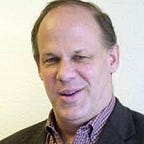Rebuilding After the Camp Fire
Every day since November 8th when the Camp Fire started, members of the labor union which I lead have been working to rebuild the gas and electric systems of Paradise, Magalia, and Concow. In the early hours of the fire they risked their lives to help evacuate those with no way to get out. Since then, they have worked from dawn to dusk, and sometimes more, seven days a week. They have worked through weeks of horrible air quality and they have worked through rain. Many are living in a temporary camp; all have given up time with their families. Many who have recently joined the effort are thousands of miles away from their families as the holiday season passes by.
By now, more than 5,000 union members are involved either in rebuilding the infrastructure that will allow restoration of gas and electric service or in an unprecedented, massive mobilization to prevent future fires. Many of our members are a part of the communities devastated by the fires. They lost their homes, and their families and friends lost their homes. For many, the rebuilding effort is personal as well as professional.
The jocularity that is a part of everyday life on the crews isn’t seen. The destruction and loss of life and property make for a somber workplace. They are keeping their heads down, working hard and focusing on the tasks at hand. They remember that a union brother died during restoration of electric service after the Carr fire earlier this year, and they pay attention to working safely.
There aren’t a lot of discussions about wildfire policy among the crews, but they have their opinions — opinions based on years of building and maintaining gas and electric systems.
When they see the advertisements and client solicitations by trial lawyers, they are stunned by the naiveté of the claim that a gas or electric system can be perfect, wherever it is or whoever is running it. They understand that the type of utility incidents that have started fires over the last few years are minor mechanical failures that happen every day at every utility, but that climate change has made those unpreventable minor failures very costly. They know that the deadly Carr fire in June was started by a minor car accident — a flat tire on a trailer led its rim to scrape the asphalt, igniting sparks that started a fire that burned 229,651 acres. They get it — minor events can have major consequences.
And when they see the California Department of Forestry and Fire Protection deeming one branch on one tree cut by a licensed line clearance tree trimming contractor to be criminal negligence, they just scratch their heads and wonder. Does CalFire not know that the contractors are trimming more than a million trees away from lines in northern California every year? Does it not know that predicting the rate of growth on a tree is not a simple exercise? Does it really expect that every branch on every tree is going to be cut perfectly? Does it really consider inadequately trimming one branch on one tree to be possible criminal negligence?
The workers who are rebuilding the infrastructure in Butte County see the blame game and the huge contingency fees for trial lawyers and wonder if anyone else understands that no utility can operate for long under the existing conditions, rules, and laws in a climate-changed northern California. Mostly though, they don’t think about policy. They think about their job today — rebuilding after the Camp Fire.
Tom Dalzell is the business manager and financial secretary of the International Brotherhood of Electrical Workers Local 1245, which represents 18,000 working men and women in California and Nevada. He began his career working with the United Farm Workers in rural California in 1972. Since 1983, Dalzell has devoted a considerable portion of his life to the study of American slang, and is recognized as a national expert. He has authored two books on slang, Flappers 2 Rappers: American Youth Slang (Merriam-Webster, 1996), The Slang of Sin (Merriam-Webster, 1998) and Damn the Man: Slang of the Oppressed in America (Dover Publications, 2010). Dalzell is the senior editor of The New Partridge Dictionary of Slang and Unconventional English.
